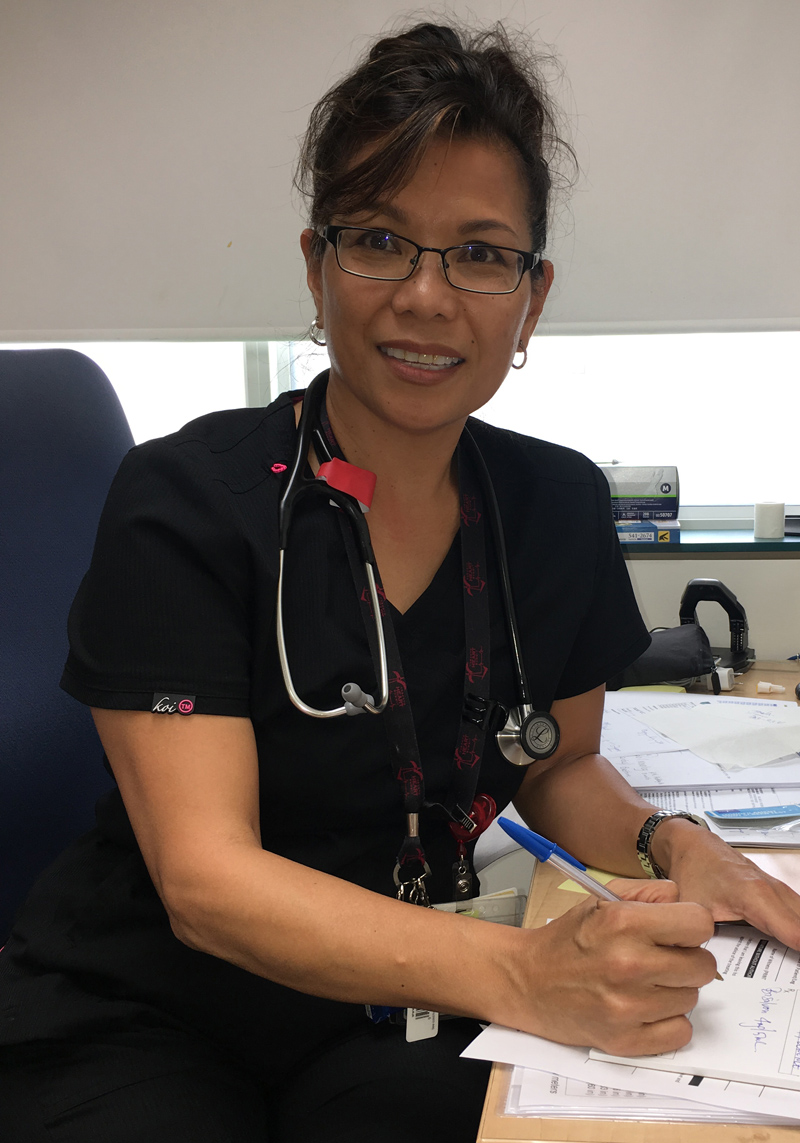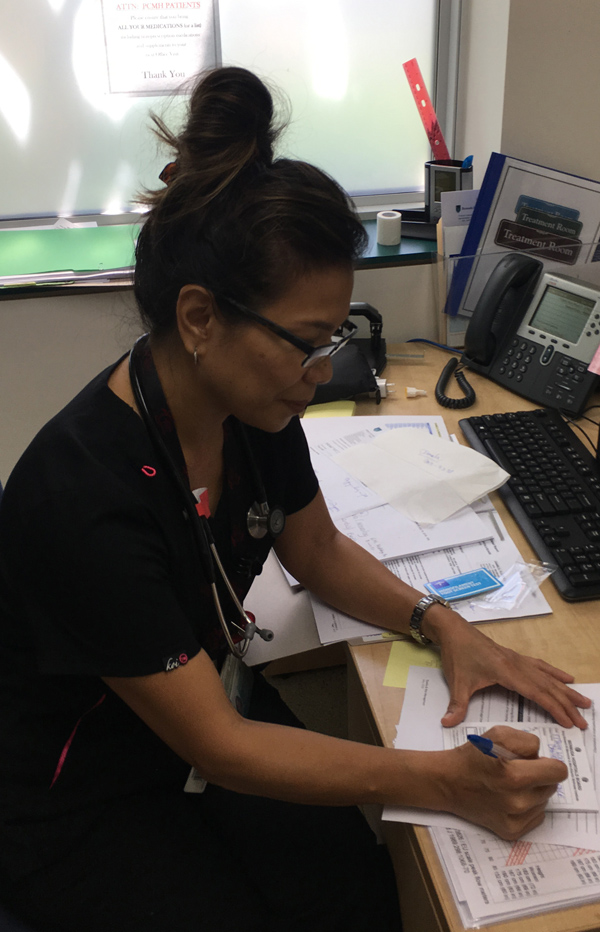Balitian-Dill Obtains Right To Write Prescriptions
Bermuda Hospitals Board [BHB] Nurse Practitioner Myrian Balitian-Dill is one of only a handful of registered nurses who have attained nurse practitioner designation in Bermuda, and she is now the first to be granted authority to write prescriptions locally.
A BHB spokesperson said, “Mrs Balitian-Dill received the news from the Bermuda Pharmacy Council on 31 August 2018. Mrs Balitian-Dill is the only nurse practitioner at BHB. On obtaining her qualification she moved into a nurse practitioner role in the hospital’s Cardiology Department.
“In November 2016 she transitioned to help set up a new service at BHB, the Patient-Centred Medical Home. The small dynamic team of this service also includes a physician medical director, a staff nurse and an office administrator.
“The setting provided the ideal environment for Mrs Balitian-Dill to be afforded the right to prescribe as Bermuda legislation dictates that prescribing rights can be granted to nurse practitioners “under the authority of a medical practitioner”.
“The new development is the result of several years of collaboration to ensure all the necessary regulatory documents were in place. Mrs Balitian-Dill is pleased with the move and sees it as a starting point and an important way to help reduce health care costs.
“While the permission only exists under the direct supervision of a physician, Mrs Balitian-Dill explains the benefit.”
“I believe it makes the system more efficient,” said Mrs Balitian-Dill. “If the nurse practitioner can prescribe evidence-based therapy at point of care, why do we need to wait for another practitioner [physician] to prescribe that therapy?”
“I applaud the path Myrian has taken in her nursing career,” said BHB Chief of Nursing Judy Richardson. “Myrian is passionate about advancing nursing practice in Bermuda. Her work with the Patient Centered Medical Home is yielding positive results. Early evidence shows improved health of clinic patients who had frequently used other services.
“Our Clinical Services Plan identified the need for a more diverse workforce which includes more advanced practice nurses like Mrs. Balitian-Dill.”
BHB CEO Venetta Symonds said, “We welcome this move by the Pharmacy Council and are proud of Myrian’s accomplishments and her dedication to provide our patients with the best possible care.”
When asked why she became a nurse practitioner, Mrs. Balitian-Dill said, “I completed my post-Master NP diploma and successfully passed my Board exam in August 2012. I transitioned into my NP role in BHB in Jan 2013 in Cardiology.”
When asked how long it took, Mrs. Balitian-Dill said, “As I already had my Master’s Degree [University of Toronto], it took about 20 months to complete the requirements for the Post Masters Nurse Practitioner Diploma [University of Toronto].”
When asked why she didn’t decide to become a physician, Mrs. Balitian-Dill said, “I was already a seasoned nurse and I was helping patients make impactful changes in their lives by teaching them about their disease, counselling them on how to incorporate healthy habits, assisting them with their medications, and helping them manage their disease at home.
“My goal was to build on my experience and incorporate more critical and diagnostic thinking into my practice to better assist my patients. It was not my intent to shift my focus from a nursing perspective to medicine, but rather to advance nursing practice. As nurses, our focus is to optimize the health/function of our patients through health promotion and disease prevention.”
When asked if her degree was in a certain specialty, Mrs. Balitian-Dill said, “There are several clinical streams you can choose to be as a Nurse Practitioner—Primary Care, Adult, Pediatric, Anesthesia. Except for the Anesthetic stream, you can choose a sub-specialty to practice in. For example, I am an Adult NP with a sub-specialty in cardiology.”
When asked if there are other nurse practitioners in Bermuda, Mrs. Balitian-Dill said, “Yes, and the Nursing Council recently registered two new Bermudian Nurse Practitioners.”
When asked if she knew how many nurse practitioners were on the island and if she was the only one at BHB, Mrs. Balitian-Dill said, “I am the only one employed in a nurse practitioner capacity at BHB. There are five registered with the Bermuda Nursing Council, but I am unaware how many are employed as nurse practitioners.”
When asked if this designation is popular, Mrs. Balitian-Dill said, “Nurse Practitioners started in the United States and Canada to address the physician shortage, particularly in rural and outreach areas in the early 20th Century. There are now about 248,000 NP’s in the United States and over 5,000 NP’s in Canada.
“The role is gaining momentum and popularity globally with many jurisdictions investing and creating advanced practice nursing roles. Global healthcare needs—such as an aging population, the insurgence of non-communicable diseases, coupled with the positive outcomes associated with NP care, have really propelled NP’s as a solution to our healthcare crisis.”
When asked if in other jurisdictions do nurse practitioners prescribe medication, Mrs. Balitian-Dill said, “Yes, but there is still a lot of variability. In the United States alone, the NP’s prescriptive authority is determined state by state. Some states allow full prescribing authority—which allows NP to prescribe independently without physician oversight and can include controlled substances, such as narcotics. In other states, there is no prescriptive privilege at all.”
When asked what she had to do to obtain this right in Bermuda, Mrs. Balitian-Dill said, “Our legislation in Bermuda permits NP’s to prescribe “under the authority of a medical practitioner”. This means that NP’s must have a collaborative relationship with an over-seeing physician. It took several years to articulate the conditions of this collaborative relationship to enact it and allow NP’s to prescribe. The practice is restrictive but it is a starting point.”
When asked to explain the right regarding its potential limitations, Mrs. Balitian-Dill said, “NP prescribing in Bermuda is restrictive. It means I can prescribe from a list that pertains to the management of my patients. For example, many of my patients suffer from chronic conditions such as diabetes, hypertension and heart disease. So, the list that I can prescribe from reflects classes of medications that help manage those disease entities.
“NP’s who work in other clinical areas will have a list that is reflective of their practice. As NP practice grows, so will the list—with an inevitable shift to open prescription. But I am getting ahead of myself.”
When asked if she is now essentially on equal footing with physicians, Mrs. Balitian-Dill said, “It is not so much about “equal footing” but rather making the system more efficient. If the NP can prescribe evidence-based therapy at point of care, why do we need to wait for another practitioner [physician] to prescribe that therapy?
“NP’s are registered nurses with an expanded scope of practice which includes diagnosing, ordering and interpreting tests, as well as prescribing and performing certain procedures. The role has overlapping skillsets with our physician partners.
“According to the Institute of Medicine, practitioners should work to their full scope of their training. It makes the system more efficient and cost-effective. This is the direction we need to go in order to address our healthcare crisis.”





Congratulations Mrs Balitian-Dill on your achievement. This is one way of keeping our burgeoning health care costs in check, hopefully others will follow.
Congratulations!!!This is long overdue in Bermuda…Nurse Practitioners are plentiful in the UK…breaking down barriers..Nurses rock!!